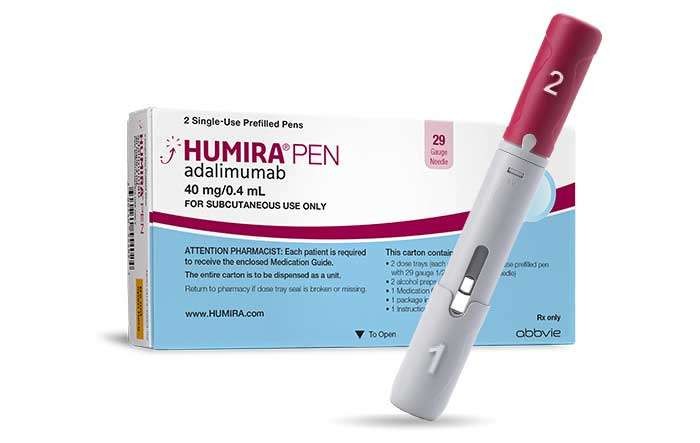
Adalimumab – Injection, Humira
WARNING: This medication decreases your immune system’s ability to fight infections. This drug may increase your risk of developing serious infections (such as fungal infections, bacterial infections including tuberculosis). This risk is higher if you are also taking other drugs to suppress the immune system such as cyclosporine. Tell your doctor your medical history, especially of past/recent/current infections. You should also tell your doctor if you have lived or traveled in areas where certain fungal infections are common or if you have been near someone with tuberculosis. Areas where these types of fungal infections are commonly found include the Ohio and Mississippi River valleys and the southwestern United States. See Side Effects section for symptoms of infection, and seek immediate medical attention if symptoms occur. Before starting this drug and during treatment, you should take a tuberculosis (TB) skin test to check for latent TB. If you are diagnosed with TB, you must first be treated for it before you start adalimumab to prevent a serious TB infection. There is a rare risk of developing cancer (such as lymphoma, skin) due to this medication or due to your medical condition. Discuss the risks and benefits of treatment with your doctor. Tell your doctor immediately if you develop symptoms such as unusual lumps/growths, swollen or painful abdomen, unexplained weight loss, persistent fever or night sweats.
USES: This medication is used to reduce pain and swelling due to certain types of arthritis (e.g., rheumatoid, psoriatic, and ankylosing spondylitis). It is also used to treat psoriasis. It works by blocking a protein (tumor necrosis factor or TNF) that causes joint swelling and damage. Early treatment of rheumatoid arthritis with more aggressive therapy, including this type of medication (TNF blockers), helps to reduce further joint damage and preserve joint function. This medication is also used to treat certain bowel conditions (Crohn’s disease, ulcerative colitis).
HOW TO USE: Read the Patient Information Leaflet and the Medication Guide provided by your pharmacist before you start using adalimumab. Use this medication exactly as prescribed. This drug is given under the skin every other week, or weekly in some cases, or as directed by your doctor. Learn all preparation and usage instructions in the product package. Rotate injection sites. New injections should be given at least 1 inch from an old site. Before using, check this product visually for particles or discoloration. Learn how to store and discard needles and medical supplies safely. Never reuse syringes or needles.
SIDE EFFECTS: Redness, itching, pain, or swelling at the injection site may occur. If any of these effects persist or worsen, tell your doctor or pharmacist promptly. Tell your doctor right away if you have any serious side effects, including: fast/irregular/pounding heartbeat, stomach pain, blood in the stools, mental/mood changes, severe headache, easy bruising or bleeding, dark urine, yellowing eyes and skin, leg pain or swelling, numbness or tingling of the arms/hands/legs/feet, unsteadiness, unexplained muscle weakness, difficulty with speaking/chewing/swallowing/facial movements, vision changes, extreme fatigue, joint pain, butterfly-shaped rash on the nose and cheeks. Get medical help right away if you have any very serious side effects, including: seizures, chest pain. Tell your doctor right away if you develop signs of infection while using this drug, such as: fever, chills, night sweats, persistent sore throat, trouble breathing, painful or frequent urination, persistent cough, unusual vaginal discharge, white patches in the mouth. A very serious allergic reaction to this drug is rare. However, get medical help right away if you notice any symptoms of a serious allergic reaction, including: rash, itching/swelling (especially of the face/tongue/throat), severe dizziness, trouble breathing.
PRECAUTIONS: Before using adalimumab, tell your doctor or pharmacist if you are allergic to it; or if you have any other allergies. This product may contain inactive ingredients, which can cause allergic reactions or other problems. Talk to your pharmacist for more details. Before using this medication, tell your doctor or pharmacist your medical history, especially of: current/past/recurrent infections, decreased bone marrow function, seizures, certain brain/spinal cord/nerve disorders, history of cancer, a certain type of heart disease, lupus. Adalimumab can make you more likely to get infections or may worsen any current infections. Therefore, wash your hands well to prevent the spread of infection. Avoid contact with people who have infections that may spread to others. Consult your doctor for more details. Do not have immunizations/vaccinations without the consent of your doctor. Avoid contact with people who have recently received live vaccines. Before having surgery, tell your doctor or dentist about all the products you use. Older adults may be at greater risk for infections while using this drug. During pregnancy, this medication should be used only when clearly needed. Discuss the risks and benefits with your doctor. This drug passes into breast milk in small amounts. Consult your doctor before breast-feeding.
QUESTION
DRUG INTERACTIONS: Drug interactions may change how your medications work or increase your risk for serious side effects. This document does not contain all possible drug interactions. Keep a list of all the products you use and share it with your doctor and pharmacist. Do not start, stop, or change the dosage of any medicines without your doctor’s approval. Some products that may interact with this drug include: abatacept, live vaccines, other TNF-blockers, certain arthritis drugs, drugs that suppress the immune system.
OVERDOSE: If overdose is suspected, contact a poison control center or emergency room immediately.
NOTES: Laboratory and/or medical tests should be performed periodically to monitor your progress or check for side effects. Consult your doctor for more details.
MISSED DOSE: If you miss a dose, contact your doctor or pharmacist to establish a new dosing schedule.
STORAGE: Store in the refrigerator away from light and moisture. Do not freeze. Keep all medications away from children and pets. Do not flush medications down the toilet or pour them into a drain. Properly discard this product when it is expired or no longer needed.
Report Problems to the Food and Drug Administration
You are encouraged to report negative side effects of prescription drugs to the FDA. Visit the FDA MedWatch website or call 1-800-FDA-1088.
Selected from data included with permission and copyrighted by First Databank, Inc. This copyrighted material has been downloaded from a licensed data provider and is not for distribution, except as may be authorized by the applicable terms of use.
CONDITIONS OF USE: The information in this database is intended to supplement the expertise and judgment of healthcare professionals. The information is not intended to cover all possible uses, directions, precautions, drug interactions or adverse effects, nor should it be construed to indicate that use of particular drug is safe, appropriate or effective for you or anyone else. A healthcare professional should be consulted before taking any drug, changing any diet or commencing or discontinuing any course of treatment.


